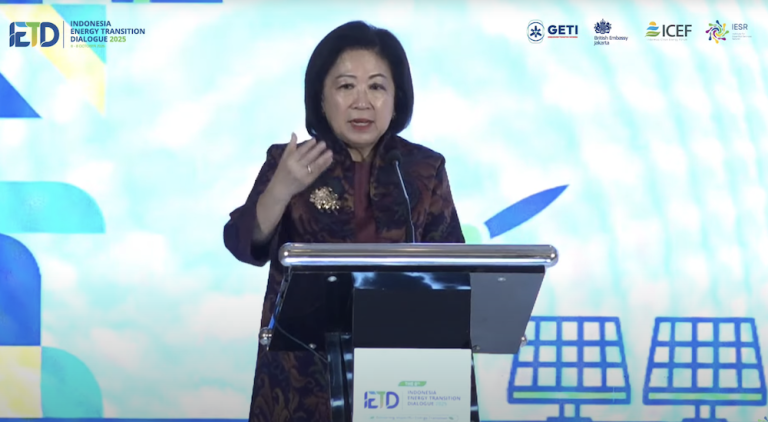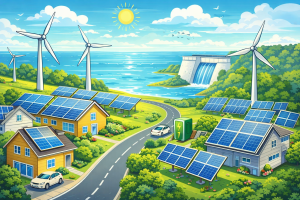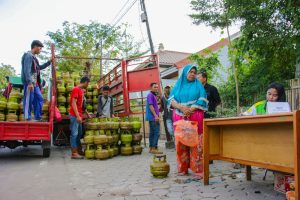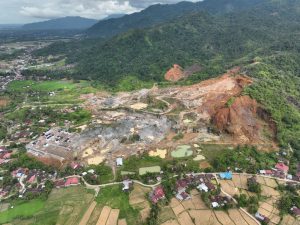Jakarta – Efforts to accelerate the energy transition are now not only a strategy for fulfilling global climate commitments, but also a key to unlocking investment opportunities and creating a new sustainable economy. This is the primary focus of the Indonesia Energy Transition Dialogue (IETD) 2025, which was opened on October 6, 2025, in Jakarta by the Institute for Essential Services Reform (IESR) together with the Indonesia Clean Energy Forum (ICEF).
The three-day event was held as Indonesia entered a new phase in its journey toward green economic growth. ICEF Chair Prof. Mari Elka Pangestu said that energy transition is not merely a matter of replacing fossil fuels with renewable energy. Instead, she argued that energy transition represents a paradigm shift toward a resilient and equitable green economy.
“For the energy transition to be effective, it is highly dependent on political commitment and policy consistency, both at the central and regional levels. An appropriate policy framework is also needed, including the establishment of a country platform for energy transition to consolidate international funding and support,” said Mari in her speech.
Prof. Mari also emphasised the importance of energy subsidy reform to make room for the development of clean energy. Fiscal incentives and carbon regulations, he continued, must be strengthened through emissions trading systems and carbon taxes.
“The revision of Presidential Regulation No. 98/2021 on Carbon Economic Value will determine the new direction of the carbon market in Indonesia,” he said.
British support and a new direction for energy diplomacy
The British Embassy in Jakarta, through the Green Energy Transition Indonesia (GETI) project, has expressed its support for Indonesia’s transition to clean energy. Matthew Downing, Chargé d’Affaires at the British Embassy in Jakarta, said that the UK is ready to be a strategic partner in promoting clean energy in Indonesia.
“We welcome Indonesia’s ambitious goal of achieving 100% renewable energy within the next decade. The UK is proud to support Indonesia’s energy transition, not only as a trusted partner, but also as part of our foreign policy,” said Matthew.
This commitment was further strengthened following a meeting between President Prabowo and the British Prime Minister in November 2024, which led to an agreement on the formation of a New Strategic Partnership focusing on climate, energy, and sustainable economic growth issues.
“We look forward to signing this Strategic Partnership to realise a just, inclusive, and ambitious energy transition,” he added.
Energy challenges and leadership amid global turmoil
The 6th President of Indonesia, Susilo Bambang Yudhoyono (SBY), in his special keynote speech on the first day of the IETD, said the importance of bold leadership in maintaining long-term policy direction, especially amid increasingly complex global challenges.
“In a world full of uncertainty, national resilience to global energy price volatility and supply chain changes will greatly determine the success of the energy transition,” said SBY.
Meanwhile, Fabby Tumiwa, CEO of IESR, believes that accelerating the energy transition could become a new engine of economic growth for Indonesia. He highlighted the need for policy reforms to attract investors, whose interest has remained low over the past decade.
“The government needs to accelerate the development of renewable energy by creating a conducive investment climate. One way to do this is by restructuring the electricity market to open up network access and provide space for private and public participation,” said Fabby.
Fabby explained that the economic impact of the energy transition will be reflected in five main pillars. First, investment in clean energy infrastructure—trillions of rupiah will flow into solar, wind, biomass, and geothermal power plants. Second, the development of green manufacturing industries is making Indonesia an essential part of the global supply chain. Third, the creation of green jobs — opening up millions of new opportunities from technicians to clean energy researchers. Fourth, increased productivity and quality of life — reduced air pollution lowers healthcare costs—fifth, national energy security — reduced dependence on fossil fuels and savings on import expenditures.
“A rapid energy transition will strengthen the competitiveness of national industries and reinforce President Prabowo’s goal of achieving energy self-sufficiency,” Fabby asserted.
IETD 2025, with the theme “Realising an Impactful Energy Transition,” serves as a forum for consolidation between the government, the business world, and the international community. Through this forum, Indonesia is showing a new direction: fulfilling global climate commitments while opening the door to inclusive and sustainable green economic growth. (Hartatik)
Banner photo: Chair of the Indonesia Clean Energy Forum (ICEF), Prof. Mari Elka Pangestu, delivers the opening speech at the Indonesia Energy Transition Dialogue (IETD) 2025, at its opening on Monday, October 6, 2025, in Jakarta. The event was organised by the Institute for Essential Services Reform (IESR) in collaboration with ICEF. (Source: Screenshot from the IETD 2025 virtual conference)















